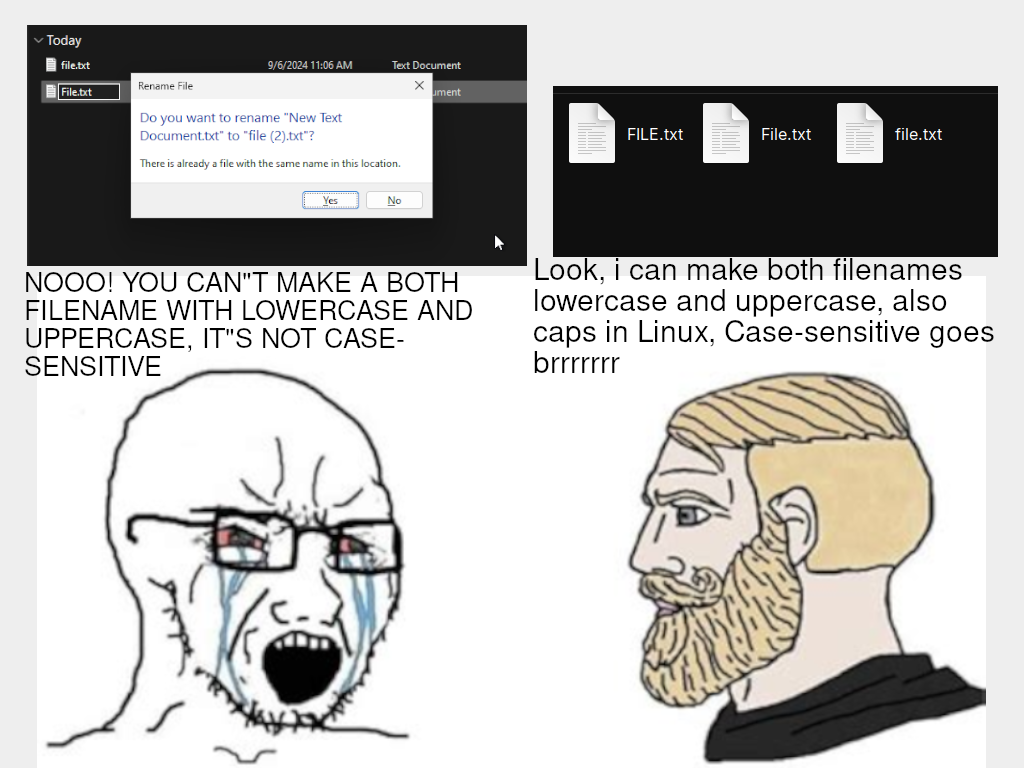this post was submitted on 06 Sep 2024
614 points (90.4% liked)
linuxmemes
24370 readers
1 users here now
Hint: :q!
Sister communities:
Community rules (click to expand)
1. Follow the site-wide rules
- Instance-wide TOS: https://legal.lemmy.world/tos/
- Lemmy code of conduct: https://join-lemmy.org/docs/code_of_conduct.html
2. Be civil
- Understand the difference between a joke and an insult.
- Do not harrass or attack users for any reason. This includes using blanket terms, like "every user of thing".
- Don't get baited into back-and-forth insults. We are not animals.
- Leave remarks of "peasantry" to the PCMR community. If you dislike an OS/service/application, attack the thing you dislike, not the individuals who use it. Some people may not have a choice.
- Bigotry will not be tolerated.
3. Post Linux-related content
- Including Unix and BSD.
- Non-Linux content is acceptable as long as it makes a reference to Linux. For example, the poorly made mockery of
sudoin Windows. - No porn, no politics, no trolling or ragebaiting.
4. No recent reposts
- Everybody uses Arch btw, can't quit Vim, <loves/tolerates/hates> systemd, and wants to interject for a moment. You can stop now.
5. 🇬🇧 Language/язык/Sprache
- This is primarily an English-speaking community. 🇬🇧🇦🇺🇺🇸
- Comments written in other languages are allowed.
- The substance of a post should be comprehensible for people who only speak English.
- Titles and post bodies written in other languages will be allowed, but only as long as the above rule is observed.
6. (NEW!) Regarding public figures
We all have our opinions, and certain public figures can be divisive. Keep in mind that this is a community for memes and light-hearted fun, not for airing grievances or leveling accusations. - Keep discussions polite and free of disparagement.
- We are never in possession of all of the facts. Defamatory comments will not be tolerated.
- Discussions that get too heated will be locked and offending comments removed.
Please report posts and comments that break these rules!
Important: never execute code or follow advice that you don't understand or can't verify, especially here. The word of the day is credibility. This is a meme community -- even the most helpful comments might just be shitposts that can damage your system. Be aware, be smart, don't remove France.
founded 2 years ago
MODERATORS
you are viewing a single comment's thread
view the rest of the comments
view the rest of the comments

I feel the same way about programming languages. There is no way that "User" and "user" should refer to different variables. How many times has that screwed people up, especially in a weekly typed language?
One of the many things that I feel modern versions of Pascal got right.
Nope. Completely different.
Case is often used to distinguish scope. Lowercase is local while uppercase is public. "Name = name" is a pretty standard convention, especially in constructors.
There is a ubiquitous use case in programming. There is not in the file system.
My point is not about how case is meant to be used my point is that it is very easy to make a mistake that is difficult to spot. I think it makes a lot more sense to the case insensitive, and force different names to be used.
This is the first time I've seen uppercase denoting scope. Usually it is done with a "_" or "__" prefix.
Casing styles usually mean different identifier types.
snake_case or pascalCase for functions and variables, CamelCase for types, UPPER_SNAKE_CASE for constants, and so on.
If we want to apply this to file systems, you could argue something like: CamelCase for directories, snake_case for files, pascalCase for symlinks, UPPER_SNAKE_CASE for hidden files.
My naming convention for C++ is that custom types are capitalized and instances aren't. So I might write
User user;.